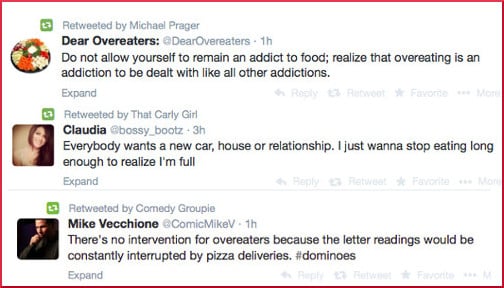Last time, Childhood Obesity News referenced a quotation by Dr. Vera Tarman to the effect that Binge Eating Disorder (BED) is related to “what is eating you” (emotional and psychological problems). In food addiction, “what you are eating” is the villain (highly processed food-like substances laced with chemicals and oodles of hidden sugar). The person gets hooked on one particular “problem food” (or maybe a few). That food is a problem because it has approximately the same effect on a food addict as cocaine does on a drug addict.
Dr. Tarman was very disappointed to find no Food Addiction diagnosis in the revised Diagnostic and Statistical Manual, DSM-5. She foresees this consequence:
We will have many food addicts funneled under the new categorization of Binge Eating disorder, and they will probably be given treatment that could ultimately undermine their recovery. Modified diets do not work for the food addict.
In other words, DSM-5, the “bible” that is meant to guide a clinician in formulating a diagnosis, appears to recommend a course of treatment that will worsen the patient’s condition. And yet history records that the venerable Hippocrates admonished physicians to “First, do no harm.”
Dr. Tarman and Phil Werdell of the Food Addiction Institute co-authored the book Food Junkies: The Truth About Food Addiction, scheduled for publication later this month. Werdall vigorously advocated the inclusion of food addiction in DSM-5 as a legitimate diagnosis, and Tarman calls him “a true pioneer: far sighted, dedicated and persistent.” Here are some words from the Food Addiction Institute:
Initial scientific estimates, according to Dr, David Kessler, former Commissioner of the U.S. Food And Drug Administration, are that about 50% of the obese, 30% of those overweight, and 20% who are at what we consider a healthy weight, are actually addicted to a specific food, combinations of foods or, in some cases, volume of food in general….At least half of the obesity crisis would be better understood and more suitably named the food addiction crisis.
That is a bold statement! If only more members of the medical establishment agreed with it, or were at least willing to consider the possibility.
Disappointing as the final DSM-5 lineup may have been, the manual did something right, or at least close enough to justify a Food Addiction Institute article titled “DSM-V Acknowledges Food Addiction.” In Werdell’s view, the inclusion of BED paves the way for the recognition, in future editions, of food addiction as a substance use disorder. To support this optimism he quotes the Feeding and Eating Disorder section of DSM-5 (page 329):
Some individuals with disorders described in this chapter report eating-related symptoms resembling those typically endorsed by individuals with substance-use disorders, such as strong craving and patterns of compulsive use.
This recognition….is of extreme importance. It gives clinicians encouragement to look for a psycho-socially caused eating disorder, a biochemically caused food addiction, or both.
Werdell makes the important point that both disorders should be acknowledged by health insurers, who seem a little too interested in avoiding anything that might cut into profits. Appropriate treatments for BED include therapy, mindfulness training, and medication, along with the modalities more often associated with addiction treatment – abstinence from the problem food, and education about dependency, along with “preparation for 12-Step-type aftercare.”
Your responses and feedback are welcome!
Source: “Binge Eating Disorder in the DSM 5: Good News or No News for the Food Addict?,” Addictionsunplugged.com, 01/30/13
Source: “Food Addiction as a part of the Obesity Epidemic,” foodaddictioninstitute.org/, undated
Source: “DSM-V Acknowledges Food Addiction,” FoodAddictionInstitute.org, 08/18/13
Image by 3 Twitter users: DearOvereaters, bossy-bootz, and ComicMikeV


 FAQs and Media Requests:
FAQs and Media Requests: 












One Response
The solution is simple but difficult at first. Abstain from eating sugar, flour and wheat in any form. See FAA website. Hope is found with FAA!